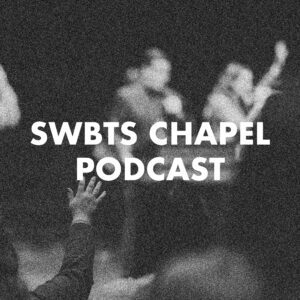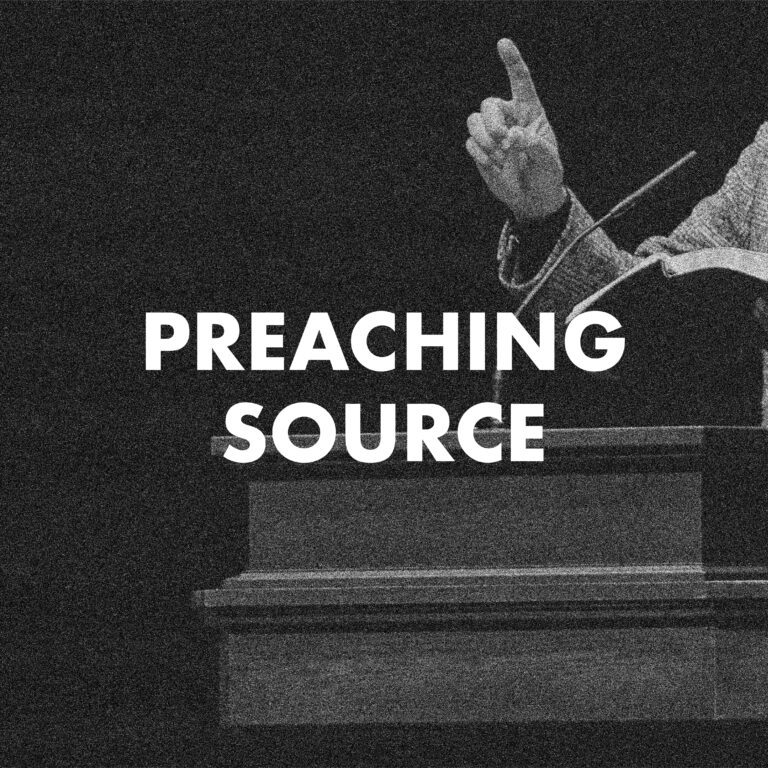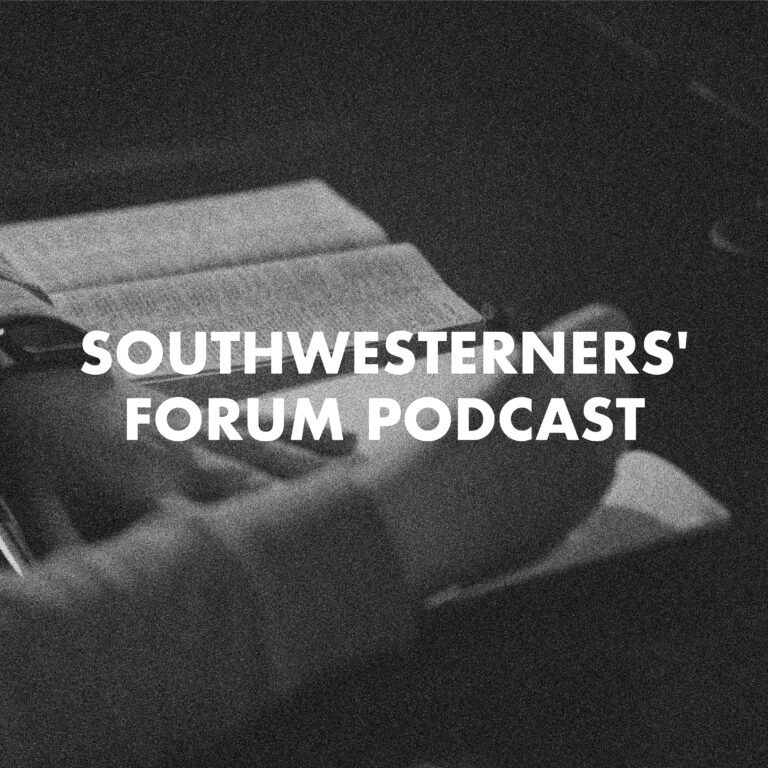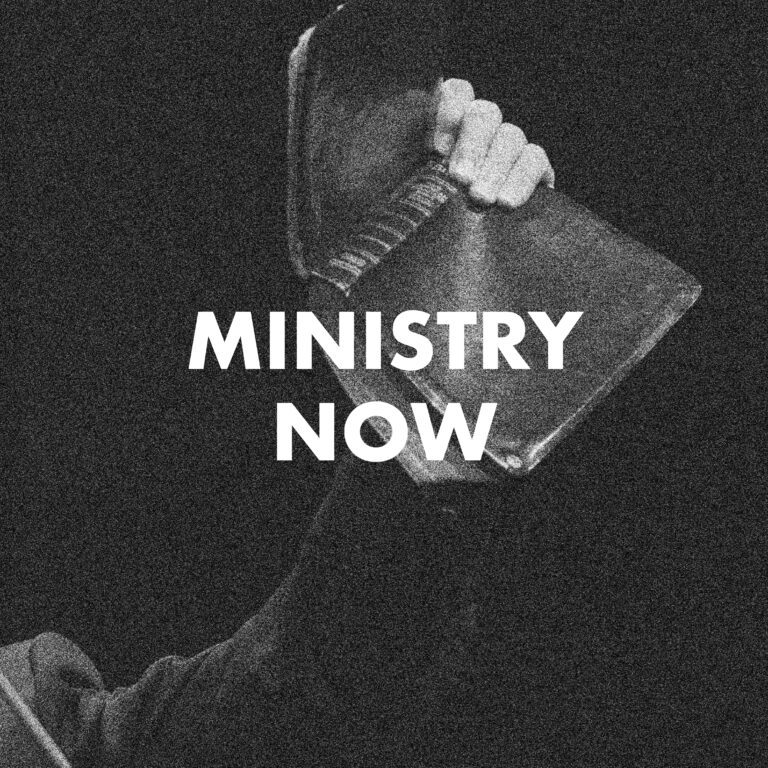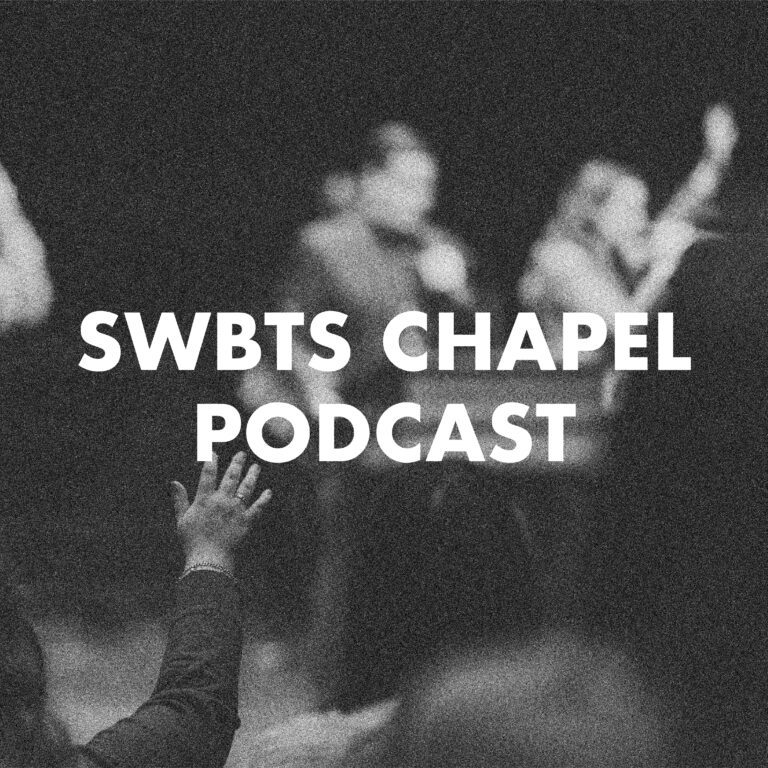Adam Dodd, Vice President for Campus Technology, and Assistant Professor of Old Testament and Biblical Backgrounds at Southwestern Seminary, preached from John 13, verses 1-15, in SWBTS Chapel on March 25, 2025.
The following is an uncorrected transcript generated by a transcription service. Before quoting in print, please check the corresponding audio for accuracy.
Adam Dodd, Vice President for Campus Technology, and Assistant Professor of Old Testament and Biblical Backgrounds at Southwestern Seminary, preached from John 13, verses 1-15, in SWBTS Chapel on March 25, 2025.
The following is an uncorrected transcript generated by a transcription service. Before quoting in print, please check the corresponding audio for accuracy.
Good morning. That was pretty good. I think I might just call it on that one to sit back down. Well, thank you, Dr Dockery for the invitation to speak this morning. It’s a privilege, and the implied trust does not go unnoticed. And the risk of that trust placed in me, I also need to thank you for this lovely copy of the scriptures. Dr Dougherty mentioned in the fall my treatment of Psalm 19, from which I did with a purple Bible from my daughter, a nice, compact little purple Bible, because it dawned on me that I didn’t own a hard copy of the CSB. I used the CSB all the time, but in digital form. And so our president, who is very generous and a little witty, gifted me this copy, and it’s an honor to use it this morning. Now, because I am a little bit ornery, I toyed with the idea of using this bad boy this morning, but like Dr Jennings, I’m a bit of a walker, and the thought of carrying this thing around was enough for me to abandon that idea.
So before we begin, let me say a word about this series. A few weeks ago, when Dr Taylor preached, I believe I mentioned my praying for this series, and that wasn’t just a throwaway comment. That wasn’t just empty flattery. This series is an important one. I have been at Southwestern, a part of this community, for 22 years, been on this campus for 18 years, worked here as part time in, part time positions, full time positions. In as many years, I have three degrees from here. I did everything wrong, got all three degrees from the same institution, been on faculty for the last five or so, and I wouldn’t change a bit of it. But I know Southwestern and I know it’s culture, and we have a moment right now if we will lean into this series. This is not just any other chapel series, if we will lean into this series, then we have an opportunity to propel this institution forward in its culture. It doesn’t matter how many of us are left here in the future.
What we do right now affects the future. And so I challenge you and myself to ask yourself, do you represent? Do you embody? Is it your reputation? Is it your pattern that these virtues and these core values, are you, if not, well, then link arms, find someone you trust, give them appropriate accountability and move forward, if so well, then God bless you, and thank you. And please continue to set the pace for the rest of us. But please this spring, let’s lean into this series. And on that note, I want to try to set a certain tone the nature of this particular passage is such that it requires some candor and it requires a spiritual kin relationship, or some hard things to say from this passage.
And so today I’d like to talk to you not as your professor or as your colleague, but as a brother, as a co laborer for the gospel, who works at a place, who has a mission that I think is worth fulfilling, and we’re not a church, and I’m not claiming that we are, so don’t put that on me. But I would like to talk to you this morning as Adam and I would like to talk to Andy and to mark, to Jim, to Eli and to Caitlin and to Micah, to Jeff and to Matt and David. I’d like to have that level of conversation this morning, albeit it might be more of a one way conversation. I’d like for you to hear what I have to say with that tone in mind. So our text, John 13, for those of you who spent some time in this text, understand this text has some complexity to it. However, what I would like to do is I would like to chart a way through this text with a very simple message.
We’re not going to deal with chronology issues in John. We’re not going to deal with compositional issues. We’re not going to deal with text critical issues as fascinating as they are, we’re not going to deal with. The foot washing practices in the early church or the lack thereof. We’re not going to deal with debates about whether or not verses eight, 910, 11 have a sacramental or a symbolic or an ethical interpretation. We might say a word about that, but my the message this morning is actually quite more it’s quite a bit more narrow. The passage has more to say than I’m going to draw from it this morning, but it at least has this to say, and I think this is what’s appropriate for us to hear this morning. So with that, let’s jump in now. I’m going to chart my way through the passage by way of four different divisions, an introduction, an act or a description or recounting, and then a dialog, and then lastly, an explanation. That’s going to be our hops that we’re going to make through the passage.
So verse one, before the Passover festival, Jesus knew that His hour had come to depart from this world to the Father, Having loved His own who were in the world. He loved them to the end. Now we can say quite a bit about the role of verse one and verses two and three, for that matter, to introduce not just this pericope, not just this passage, but the whole latter half of the book of John. But that would take us a little bit farther afield than I want to go. So let me just point out one or two things from verse one. Number one, note that everything that’s going to happen in the verses that we read here in a moment flow is grounded in and flows out of his love for his own, and it’s his own, in contrast to those who are not his own, those that are of the world. And it’s this shift that we see here in the book of John, from Jesus’s public facing ministry to a stricter focus on those who are His and He loved them to the end, an allusion to the crucifixion, which is just a few chapters away, and depending on your chronology, a few hours into the future.
Moving on into verse two through five, the second section, the act, or the recounting, the thing that is done, reads, now, when it was time for the supper, the devil had already put it into the heart of Judas Simon Iscariot son to betray him. Jesus knew that the Father had given everything into his hands, that he had come from God, and he was going back to God. Read that again. It’s a statement of his authority and his power. Jesus knew that the Father had given everything into his hands, that he had come from God, and he was going back to God. So with that statement of his authority, so he got it from supper, and he laid the smack down on the devil and on Judas. He brought the People’s Elbow down on Judas. He got on the ancient equivalent of social media, whatever that was probably just talking to each other, and he railed against Judas and the devil on social media. I mean, that’s what we would expect after a statement relating relaying His power, His authority, we would expect the claim of his victory, his superiority, his dominance, his doing the thing that that power enabled, but that is not anything like what happens here. The Kingdom that he is ushering in is a different sort of Kingdom.
Instead, he got up from supper and he laid aside his outer clothing, took a towel, tied it around himself. Next, he poured water into a basin and began to wash his disciples feet and to dry them with the towel tied around him. So the kingdom that he is ushering in is one in which after a claim or a statement of his authority, he serves the one who is actually opposed to him, or at least, presumably from the context here, this is a different sort of kingdom. Now, let’s say a word about the washing here. I don’t want to go, I don’t want to, I want to go too far to the side, but I am interested in this sort of thing. If we were to think about ancient watching, washing practices, you can, and this is a gross oversimplification, but you can think in terms of three ish sorts of categories. You can think so think in terms of an initiation washing, something like Christian baptism, which is advocated in the New Testament, and then by the fathers as a non replicating one time thing that you do upon entrance into the community.
You can also think in terms of ritual purification. This isn’t a one time thing. This is something that’s done over and over again for different in different contexts and for different reasons. We see this exemplified in Exodus, whenever the priests have to wash their hands and their feet before serving in the tabernacle. We see it at Qumran, if you’re familiar with that site where the Dead Sea scrolls were discovered by their numerous mikveh oat where they would wash their full body multiple times a day before and after different sorts of events. We see the same sort of thing outside the temple in Jerusalem. We have a score of mikveh oat out there. So before people would enter into the temple precincts, they would wash there. We see mikveh oat in people’s houses, in the priestly house, as well as more common houses, and it wasn’t always a full body immersion. They would wash their hands or their head or their feet or different parts, depending on the nature of what they were doing.
We find stone vessels in the archeological record all over the place at this time, indicating that ritual purity was of keen interest to them. But I don’t think that’s what’s in view here. The third category is that of hospitality. Hospitality meant a fair bit more in the ancient world than it does to you and I you and I probably minimized the value of hospitality or manners or those sorts of things. But this was not just a social norm that you could violate if you didn’t feel like it. It was a virtue. It was an ethic. It was far more valued at that time, and one expression of hospitality was providing a means for your guests to wash themselves their feet, in particular, upon their entrance into your home or in preparation for a meal. We see this also in the scriptures. We can see it in Genesis 19, when the Lord and His messengers come to commune with Abraham, he provides them water to wash their feet. We see it in the next chapter in Genesis 19, whenever those heavenly messengers make their way to Sodom and lot provides the same thing to them. We see it from the man of Gibeah to the Levite and his concubine and judges 19 whenever they’re in the town square and no one is taking them in.
And what. What a critique of that town that no one took them in because they had bad hospitality. So this man of Gibeah is the outlier, and he provides the water for them to wash their feet. Perhaps a passage that’s relevant to our topic today comes from First Samuel 25 where Abigail is sought out by David’s servants to bring her to fetch her to be his wife. In her response to them, she says, Hey, I’m your servant, a slave to wash the feet of my Lord’s servants. And her vocabulary there indicates the subordinate position of someone who would actually produce do the washing of someone else’s feet, not beyond just providing the means for a washing, but for someone to actually do the washing. She refers to herself as a servant and a slave, not just to wash David’s feet, but to wash the feet of the servants that he sent to fetch her something similar we see in Luke seven with Jesus’s critique of Simon the Pharisee, Pharisee, and we will read that in Luke seven, verse, 44 he turned to Simon and said, Do you see this? Woman? I entered your house. You gave Me no water for My feet, but she, with her tears, has washed My feet and wiped them with her hair. You gave me no kiss, but she hasn’t stopped kissing My feet since I came in. You anoint you.
Didn’t anoint my head with oil, but she has anointed My feet with perfume. Therefore, I tell you, her many sins have been forgiven. That’s why she loved much. But the one who has forgiven little loves little. It is the station of this woman that Jesus is adopting in his washing of the disciples feet. She comes to him. She has no station, no position, no entitlement, no reason to deserve the forgiveness that she is seeking from Jesus. He has all of the position, all of the power, all the authority, and in the washing of the disciples, Jesus actually flips the script and assumes this position that is exemplified by this woman in this passage. For His disciples, He upsets the apple cart significantly, and one of his disciples, at least, is recounted. One of them takes. Issue with it. He sees the impropriety, and he calls it out, even if he doesn’t know what to do with it. And this leads us into our next, next section, third section, the dialog. So verse five, I’m sorry. Verse six, he came to Simon Peter, who asked him, Lord, are you gonna wash my feet.
Now Simon may very well have ringing in his ears the stories of Jesus’s or near Jesus’s baptism, where John the Baptizer said, Hey, there’s some coming after me, and I’m not even fit to untie the strap of his sandal. Why would he be untying the strap of his sand sandal, potentially to wash his feet. So in Peach’s mind, here’s one, that John is not fit to wash his feet, and yet he is getting ready to wash my feet. Now, John, for sure, gives us a family friendly, G rated version here, but Peter, he was a roughneck fisherman from Galilee, and if he dropped expletives, he probably dropped one right about now. Now I don’t mean to offend you by that statement, but I want you to hear the shock of this. Jesus is completely upending the expectations, and it is completely inappropriate for him to do so according to the social standards of that time, Peter’s pushback is not one of impropriety, it’s saying I’m supposed to serve you.
Why are you serving me? Jesus answers. He said, what I’m doing. You don’t realize now, but afterwards you’ll understand. So just give us some time, Peter and we see this told out or carried out later in the in the scriptures, where the disciples understand things later that they don’t understand immediately. Perhaps this is one of those. And Peter doubles down. He said, You will never wash my feet, Peter says, and Jesus’s reply is as direct as Peter’s response there, he says, If I don’t wash you, you have no part in me. What does that mean?
So Peter replies, Lord, not only my feet, but also my hands and my head. Jesus replies, one who is bathed doesn’t have need to wash again or wash anything except for his feet, because he is completely clean. You are clean, but not all of you. What does that mean? Now we can delve into the debates around these verses, but that would take us well into the afternoon. So what I want to say is just one thing, it is right and appropriate that the comments here about washing foreshadow the crucifixion to come just a few chapters down the road. But I don’t know if that’s adequate to understand these words. I don’t know if it’s as simple as saying, oh yeah. Jesus is saying, If I don’t wash you have no part of me. He’s saying, Oh, the crucifixion to come. If that doesn’t cleanse you, then you’re not you’re not one of mine. I think that’s right, but I don’t know that it’s adequate, the logic, the economy, the ethic that is required by the atoning work of the crucifixion is the same economy required for Peter to submit and let his king wash his feet. He can’t reject the one and accept the other.
They are tied to the same economy, the same ethic. So in Peter’s refusal to let his king wash his feet, he is showing that he would not be one of Jesus’s were he to maintain that refusal. So let the let the weight of the foot washing actually kind of sit on it, sit on us for a little bit. This is, this is more than just social practices, and it’s more than just an allusion to the crucifixion. I don’t mean anything pejorative by saying just an allusion to the crucifixion. What I’m saying is those two things are tied intricately to. Together, and his ability to accept the upside down kingdom of Jesus and let the King wash his feet is requisite for him to accept the upside down kingdom of the king, to pay the price for the servants.
And this brings us to our last section, the explanation says, When Jesus had washed their feet and put on his outer clothing, he reclined again and said to them, Do you know what I have done for you? So here, Jesus is going to give the explanation, the meaning, the significance. And there are two things I think that are worth pointing out for us here. The first is that in his actions, Jesus does not abdicate any of his status, any of his role, any of his authority. The next verse says, You call me Teacher and Lord, and you are speaking rightly, since that is what I am. The lowliness of the Act has not threatened any part of his role, status or character or identity. The second thing is that the instruction to his own to those who follow Him is clear and explicit.
So if I, Your Lord and Teacher, have washed your feet, you also ought to wash one another’s feet, for I have given you an example that you also should do as I have done for you. The expectation is that after his departure, the disciples will be willing to assume lesser roles in service to one another, that they will not shy away from menial tasks, that they will put the goals and the interest of others above their own, that they will not crave power and position and authority, especially not in competition with one another, that they will not behave like James and John and Their mother did in seeking a high position for them, or like the whole of disciples did, at least on one other occasion, in arguing about who is the greatest among us, He has given them an example. He has set the model. It’s that example that they should assume for their own lives. It’s the spirit of that example that they to which they should aspire, that’s the reputation that they should seek to build for themselves and for the one that they represent. He provides the model. He provides the example their job is to follow, to imitate, and that is ours as well. It is not that different for us. He provides the example; he provides the model. We imitate.
And in fact, the next couple of verses, which I’m going to peek just a little bit past verse 15 here, help us with this. And they’re a little sharper, I think, than we normally give them credit for. They say, he says, Truly, I tell you, a servant is not greater than his master, and a messenger is not greater than the one who sent him. If you know these things, you are blessed if you do them. Now, there is at least one implication here, and I’m not suggesting it’s the only implication, but one implication is that Jesus is the master and they are the servants. He is the sender, and they are the messengers. So if they are unwilling to follow his example, then perhaps he isn’t their master. Perhaps it’s not his message that they carry. If Peter is unwilling to let the King wash his feet, then perhaps he doesn’t have a share in the kingdom that requires that upside down ethic. If you and I are unwilling to follow in the example of assuming the lowliest of positions in service to one another, then perhaps we don’t know who our actual. Or is then perhaps we don’t know the message that we’re actually carrying.
Perhaps we don’t know the way of this king as well as we ought, or as well as we think. So. Let us prove our share in this kingdom. Let us humble ourselves, let us assume the role of servants. Let us forsake whatever status we have and let us serve the family of God, instead of serving ourselves, this is a challenge. This is my challenge to you. This is my challenge to me. This is a hard thing for me to say. This is a hard thing for us to hear that our posture of service, especially in positions of leadership, in whatever leadership capacity you have, and you have influence, if not formal, positional leadership, that it is closely tied to, how well you know the king, what message you tell and who you actually submit To. Now I’m tempted, or was tempted, to end on this rather poignant note. This is a powerful note for me, but my fear is, if we stop here, then I leave the impression that somehow this is limited to this passage, or this instance in Jesus’s ministry, or perhaps Jesus’s ministry alone, or perhaps in the New Testament alone. And I think Dr McKinney glasses off. I think that’s utter rubbish. What I think instead is that what we see, the imagery that we see in this passage is actually one instance of an economy of God that is replicated and shown over and over and over and over and over again throughout the scriptures, in the New Testament and in the old in response to the Sons of Thunder asking to sit on his right and his left. Jesus gives him a correction.
He says, you know that those who are regarded as rulers of the Gentiles lorded over them and those in high positions act as tyrants over them, but it is not so among you. On the contrary, whoever wants to become great among you will be your servant, and whoever wants to be first among you will be a slave to all. For even the Son of Man did not come to be served, but to serve and to give his life as a ransom for many. Likewise, Paul, in his exhortation to the Philippians urges them to do nothing out of selfish ambition or conceit, but in humility, consider others as more important than yourselves. Everyone should look not only to his own interest, but rather to the interest of others. He followed up this exhortation with a hymn which, by the way, is embodied quite well in the description of Jesus in verses five through 11 in this hymn that’s well known him, states that Jesus, who existing in the form of God, did not consider equality with God as something to be exploited. Instead, he emptied himself by assuming the form of a servant, taking on the likeness of humanity. And when he had when he had come as a man, He humbled himself by becoming obedient to point to the point of death, even death on a cross. Peter, intriguingly, in his first epistle, gives this exhortation, I exhort the elders among you as a fellow elder and witness to the sufferings of Christ, as well as one who shares in the glory about to be revealed Shepherd GOD’s flock among you, not overseeing out of compulsion, but willingly, as God would have you, not out of greed for money, but eagerly, not lording it over those entrusted to you, but being examples to the flock. And when the chief Shepherd appears, you will receive the unfading, unfading crown of glory. In the same way you, who are younger, be subject elders. All of you clothe yourselves with humility toward one another, because God resists the proud but gives grace to the humble. Even the First Testament, the Old Testament, has plenty to say about this. We see prophet after prophet after prophet rebuking wicked king after wicked king for oppressing their people. The Proverbs exhort us over and over again to use our station for the good and the blessing of others, whether it’s Proverbs, 11:14, 21:28 31 the Psalms hold up as an example, the one who uses his or her resources to defend those who lack resources who don’t have a defender.
Why? According to them, because that’s the way that. God is, Jesus said over and over that he and the Father are unified and that he does only what he sees the Father doing, that He is the image of the Father, and that he has sent out his own just as has been as he has been sent out by the father, so to see this as isolated and not the consistent message across the scriptures is incredibly narrow minded, in my opinion. So students, staff, faculty, administrators, this is our God. It is who he is. It is his character. It is not a temporary measure. It is not a means to an end. So don’t think this is something that will come to a conclusion, or that you can use to really get what you really want, your power. It’s none of those things. It is who he is, and it is how he has made this world to function. Embrace his upside down ethic. Get on the ladder and go down. If you want to lead, lead by serving. Set the pace by serving. Do not advance yourself, but lower yourself. That is leadership in this model, in this ethic, in this economy, Jesus, out of love for His disciples, gave them an example and exhorted them To follow that example. One of those disciples recorded that for our instruction. So my challenge to you, my appeal to you is embrace the discomfort of living out this ethic in a broken world. Be willing to be a weirdo, an image or witness Jesus to his own creation by serving one another his own. Let me pray for us.
Father, I confess that it is our pattern. It is my pattern to seek what is good for me, to want to advance, to not want to give up that which has been given, to want to protect reputation, to want to gain favor and esteem in the eyes of others, and I ask that for me and for everyone In the room, and for those watching online or later that you would, by way of the spirit, show us and remind us and give us the courage to live out a better way Where we are eager to serve others, where we don’t seek our own, where we’re willing to assume menial roles with no credit and No fame and no accolades and no thanks, even. But that we would do this over and over and over again, eagerly, eagerly, eagerly, knowing that this is the way that you have loved us, this is the example that you have provided to us, and this is the way your kingdom works. I pray this in Jesus, strong name Amen.
